TAPE 80/SHH/01
THIS TAPE HAS BEEN RECORDED ON APRIL 14TH 1980 AT 2 CRABTREE BUILDINGS, BURY ROAD, RAWTENSTALL. THE INFORMANT IS GEORGE PICKUP, SCUTCHER. THE INTERVIEWER IS MARY HUNTER.
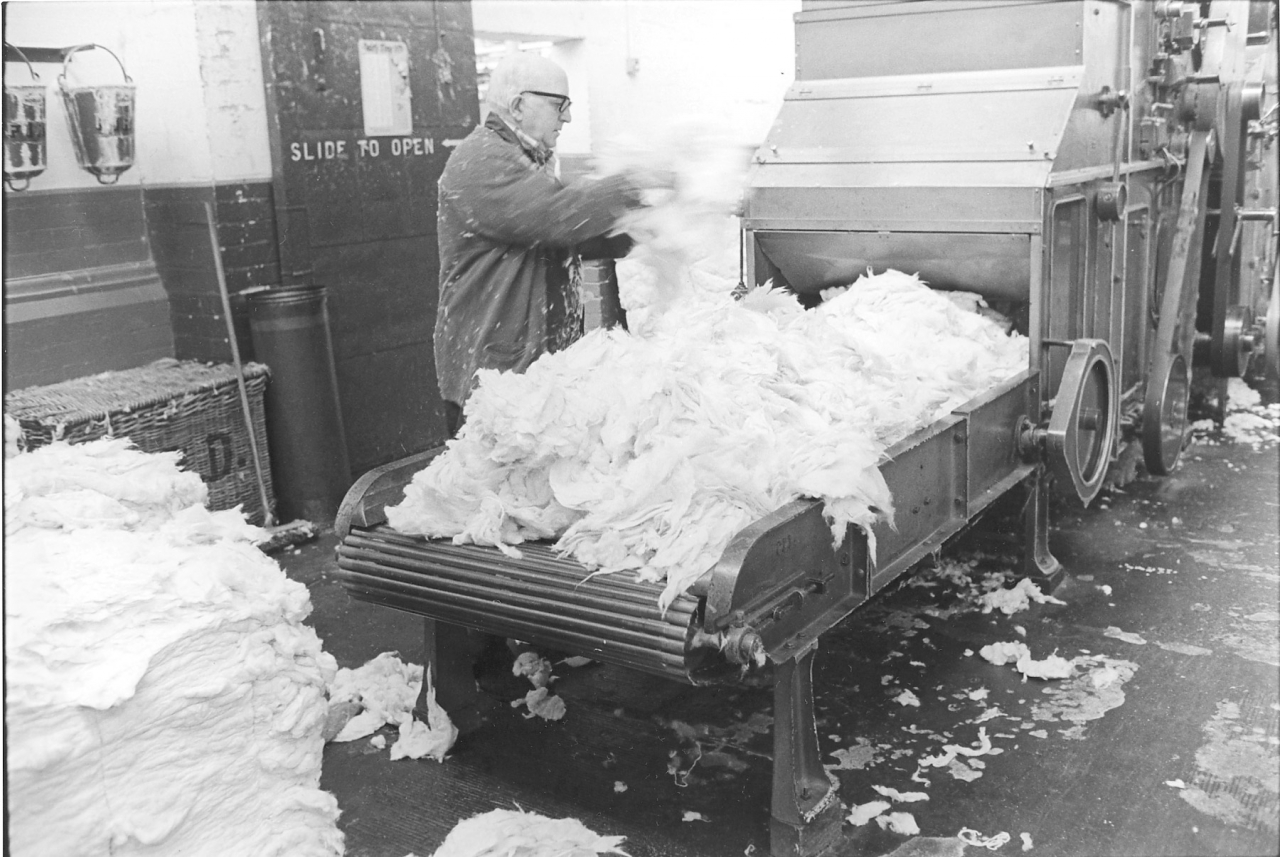
George Pickup at work on the scutcher at Spring Vale.
Now, George it's very good of you to let me come and record you at your house, so soon after you've finished at Spring Vale. It must have been a bad day, was it?
R – Yes. I hoped to have ended me days there, retired.
I’m sure you did. How old are you if you don’t mind me asking you?
R – I’ll be sixty-one this August.
61. So you only have four more years to go to retirement. Yes. Did it come as a shock to you to hear that the mill was closing?
R- Really a bit of a shock, yes.
People I think had heard rumours though, hadn’t they?
R- Yes, there was rumours, yes rumours. Well, I hoped to have finished me years there at Spring Vale, I enjoyed the years that I worked there under good supervision and, and the bosses very good indeed.
Yes. I’ve heard everyone speak well of them.
R- Yes, very good.
How long had you been at Spring Vale?
R- I would have been at Spring Vale nine years this month, April.
And had you always been on the scutcher since you've been there?
(50)
R- Most of the time, yes. I started there on the doubler and then from there got transferred, someone retired on the scutcher and I took over from there.
Were you taught how to use it or was it something you just picked up?
R - Oh I had two or three hours and the job were all right, I could do it.
Good for you. Can you tell me where you were born?
R- Born in Clowbridge.
That’s this valley isn't it?
R - Going towards Burnley. Yes.
Yes.
R- All those houses is demolished now nearly, there's only about three up.
Oh yes, that's right, they’ve built a new factory or something haven't they? It’s just underneath the reservoir isn’t it?
R – At the side of the reservoir, yes. There used to be houses and then there used to be a cotton mill down in that bottom there where the brook runs down.
A water powered one was it, originally?
R- Yes I think it was, me mother used to work there.
Your mother did?
R - Yes.
What was she?
R - A winder
And had she always been a winder?
R - Yes as far as I know.
And was your father in the textile business as well?
R - No he were an outdoor worker, he used to work outside.
And how many were there of you, in the family?
R - Three brothers and a sister.
And what did they all wind up doing?
R - A sister worked in cotton and me other two brothers, all four of us worked in cotton.
So you followed on from mother?
R - Yes. All the four of us.
All in spinning?
R- No. I think me brother worked at Lower Mill, Whitehead’s, in the card room, and the other brother Leonard he worked at Oak Mill at Dunnockshaw, he were grinding, and me sister worked at Crawshawbooth at Britannia in the card room, I think it was in the card room yes. And I worked at Oak Mill at Dunnockshaw.
Oak Mill?
(5 min)
R- Yes. 1 was at Oak Mill Dunnockshaw and I was called up in the army and then I came out on ‘B’ release, because at that time they were wanting as many people back in the cotton you know as they could get. So the manager there got me out on ‘B’ release, I came out and went straight back to the same factory.
Well before my time.
R - Yes. I went back there and then from there I went over to Drury Mill at Helmshore, a carpet firm. And then I lost me first wife at forty three while I were there, and it were night work so I got a bit fed up and I applied for a job at Spring Vale. Now I knew the bosses, John Greenwood was there and Sutcliffe and I knew them and I got on there and I was there ever since up to now, being made redundant.
We've taped John Greenwood already.
R – Yes, John.
Stanley’s taped a number of tapes with John. So you left school at fourteen did you?
R - At fourteen yes.
And where did you go from there?
R- from there? I think I started at Britannia Mill at Crawshawbooth.
As what?
R- Tuber.
As a tuber. Yes, doffing etcetera for the spinner.
R – Similar.
And can you remember how long you were there?
R - Four years I should think.
And from there…
R - From there I went to Dunnockshaw.
And were you doing the same job there?
R- I was on a derby Doubler there, at Dunnockshaw.
Same sort of Derby Doubler as they have at Spring Vale?
R- A similar one as they have at Spring Vale yes.
Yes. And you were there for how long?
R- Dunnockshaw? Quite a few years. Till the war broke out, a few years and then I was called up in 1940.
(200)
So you were at that mill when you were called up. And what sort of mill was that?
R- Cotton. Similar to Spring Vale.
They were making cloth?.
R - Yes, oh from there I went down to the warehouse like ...
Just spinning then in fact was this?
R - Yes, spinning and card room.
And then you, as you said, you were called back on ‘B’ release, to that same mill?
R - Yes. The same Mill.
What happened after that?
R - Then I left, I went to Drury Mill and the carpet firm and I worked there a few years and then I lost me wife.
Yes, that’s right, you've told me that before and then you came down to Spring Vale, you knew John ...
R- Spring Vale.
And the Mr Sutcliffe you mentioned, were they the owners there?
R- No, they were just managers, Hardman’s were the owners.
Hardman’s?
R- Yes, they were the bosses like Roy here is now, John Greenwood were in his place.
And Mr Sutcliffe.
R - And Sutcliffe was the boss in the card room, you know, supervising...
Oh I see. Yes like…
R - Like him who is in there now.
Mr Gower.
R - Pilling and
Joe Pilling and Charlie Gower? Yes.
R - Charlie yes.
(10 min)
Yes I see. Very good. And there were two scutchers weren’t there at Spring Vale. Is that fairly normal to find two or are there usually more?
R- No I should think about two at the size of them mills.
And comparing Spring Vale with the other places you worked in, is it a mill or a large mill?
R- I should say a bit larger if anything.
A bit larger than average?
R – Yes.
And are your family still in textiles today? Or have they all suffered the same fate that's now befallen you?
(250)
R- No I’ve lost one brother, the other brother's at Hull somewhere, and me sister’s there somewhere.
At where.
R - At Hull. They've moved on to Hull, me father died ...
So they are not in textiles any more?
R - No.
You say you sort of had an idea that the mill was closing ... Have you any idea yourself on what sort of, what are the reasons for it closing?
R - Well, I think one thing is that they haven't modernised at all, and it’s the same old tale.
People having kept up.
R- Yes, I think if they'd had it modernised I think they'd still have been going.
But do you think there is still a market for the hard waste side of it.
R- I think so.
Yes. Because everybody now seems to be much more interested in the synthetic fibres and the hard waste industry perhaps hasn't got the market it used to have.
R – No, it may have dropped off a little bit but I should think there'll be market for it yet.
The atmosphere at Spring Vale always impresses me you know, it seemed to be a really friendly place to work.
R – Yes it was.
And people welcome visitors you know. I felt very welcome only after being the first time. Do you think that's got something to do with the industry having been a fairly tough industry to work in ?
(300)
R - As being all in the same boat?
I suppose that's got something to do with it. I just felt that it might have something to do with the fact that it’s fairly hard, repetitive work and that if you didn't all get a kick out of enjoying each other's company it would be pretty miserable days just spent ...
R - Miserable to work ... on your own there. Oh yes.
Did you feel it was a happy place to work in?
R - Yes I enjoyed being there yes. Yes they are all good lads and lasses as they say, to work with.
Yes. I should think with your job you perhaps felt a little bit cut off from everybody else because you had a separate room didn't you, and there were just the two of you.
R- Just the two of us, yes.
How many mates have you seen come and go in the time you've been there?
R- A few. Some’s left and some’s come back.
Yes. The person that actually runs the other scutcher, have they been fairly constant people or have there been several of those?
R - Yes there was one on, he were a very good man at his job and also in the devil hole where he used to work his overtime and I will say this as he was very good at his job.
Andy, and he was with you the whole time you've been there.
R - Yes up to me friend coming on, Billy what’s on now. I don't know his last name, the big fat one.
Oh the one that’s on there now? If we start to look at the photographs now George [Mary is using the Carding pictures in the Spring Vale folio], and I think perhaps if we start at 15.01 which is the bales in the warehouse and you can perhaps tell me what you're doing there or what is going on there should I say 'cause you are not on that photograph are you.
(350)(15 min)
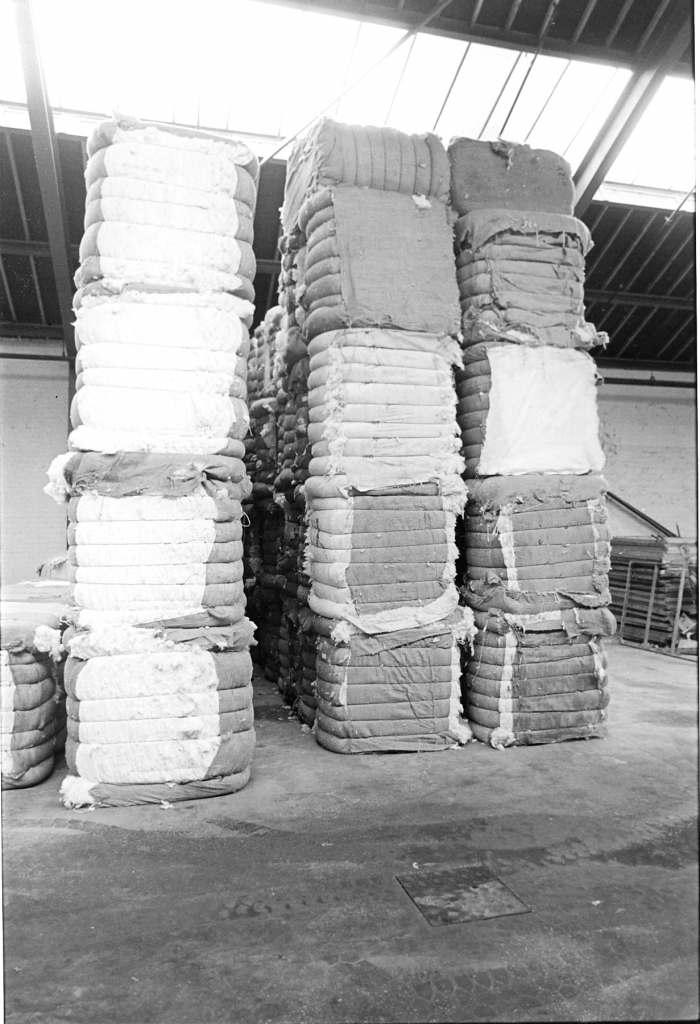
R- No, not on here, have I to start on the other?
No, if you start there and say what's happening.
R- Well, the bales, the bales go in from the press, and then from there they go to the warehouse, and then from the warehouse four bales are brought in to me to put down behind the machine which I open up. There are four steel wires round to hold the bales in position, and I crack then open and then clear the labels off, and start to feed my machine from there.
Why do you have four bales George?
R- Always had four bales.
No particular reason.
R - No particular reason, no.
And they'd all be exactly the same quality, would they?
R- Yes, all the same yes.
And why are they stored in the warehouse?
R - Oh they say the longer they're stored there and the better it is. I don't know why,
I've heard the term ‘conditioning’, is that the word that’s used?
R- Yes, conditioning, yes.
So when they come to you they’ve got the oil and water on I gather.
R- The wire yes.
Then they've had the oil and water put on them, on the cotton.
R – Yes, like spread on it in the room upstairs yes.
And how often do you have these four bales? I mean how often do they
come down to you?
R- Oh, I can open four bales at half past seven and then open another four up sometimes just before dinner, or directly after dinner. I had to use about eight bales a day.
How heavy were the bales?
(400)
R- Some two hundred and fifty eight pounds, three hundred and odd pounds, varies.
And how heavy are the bobbins that you take out at the back end of the machine or should I say the front end, it depends what you call it.
R - Yes, I mean we know, I should say about fifty odd pounds.
Moving on to number 16 and that's your machine which is called the…

R - Scutcher ...
It’s called a scutcher yes.
R- Yes, scutching machine.
And what’s the principle of this machine, what happens, do you know?
R- I feed the bales at the back, and there it goes underneath the cover and it's took up on a spiked lattice through here, and then dropped down into there into the middle .. well I call it the bin.
Bin.
R- Bin.
Bin, yes.
R- And then it's broke up, and then goes up another spiked lattice and then drops down behind a cover, and there it's all broken up, and goes along a lattice which is going all the time and then it goes through, out at the middle, makes a full lap and then when the lap’s ready for coming out it knocks itself off.
Yes it automatically stops. So really it's another process of breaking down the cotton fibres, to make them all go in the same way, and smooth and ready for the carding process.
R - Yes that's right. Carding process.
You say that in the first cylinder there is a spiked lattice?
R – Yes, spiked.
Are they a wooden lattice with metal spikes?
R – Yes.
And do you often have a break down on them?
R – No, what shall I say, considering the age of the machine, 1912, it's been a damn good machine to run.
(450)
1912? Is that when it was put in?
R - Nineteen twelve.
Yes. And how often did you have to overhaul it?
R - Well I've been told as I've had the cleanest machine in the factory.
Is that right? Well that must be a credit to you.
R - Because my policy is always have a clean machine, oiled and maintained up to the top and if you look after your machine I think it's ...
It looks after you?
R - It looks after you.
Yes. And it obviously did do.
R- Yes, a really good runner.
And how often did you clean it? I know I came down a couple of times and you were cleaning it..
R – Yes. Well, we generally, I always used to get in front with my work because I kept going, no messing about. I carried on with me job, and got to the front and stopped on Thursday night and cleaned Friday.
And when you say you got in front, does that mean that you would produce more laps than the breaker cards could take?
R- Yes, always at the front.
And there was no storage place there for anything that you produced?
R- Yes. Inside the card room on that boarding where we…
Oh I see. So you used to be allowed a day a week to clean it?
R- Yes.
And did you enjoy that or did you always used to wake up on a Friday and think oh goodness it's cleaning day today?
R – No. It never used to bother me, I used to just carry on.
Good for you. If it did break down or it developed a slight fault what was usually wrong with it?
R- Probably only just a minor fault, probably a strap breaking or something like that.
When you say strap, do you mean one of the driving belts?
R- Yes. One of the drive belts but nothing seriously went wrong with it.
Was it a dangerous piece of machinery to operate?
(500)
R- No there’s plenty of guards on.
Yes I must say there seem to be more guards on that machine than on most. I just wondered if there were places where fingers could get caught and things.
R - I dare say there’d be one or two places where you could get caught but you keep clear of them.
Yes, OK. What is that on the top? There’s two pipes coming out and then some sort of a circular system, What’s that called?
R – Oh that was before I took over, I think that was at one time was for the dust extracting, you know to take the dust away, and then they came up with this at the front there and went on to that.
Oh so that’s the old dust extracting system but the trunking at the, now you call this the front of the machine don’t you?
R- Yes.
At the front, funnel shaped and then piped trunking right across.
R- Right, round.
Then that’s the same dust extraction system as the rest of the mill has is it? Is this stone floors?
R – Yes, the old stone floor is this.
Did, did you find the place cold to work in?
R - Sometimes in the winter, yes. We've had one or two winters where the steam job's not been so good, and we've all had to put us cardigans on and it were really cold.
Your place is in one way, you can either perhaps benefit from the heat from the devil room…
R - Devil room yes.
Or you can suffer from the draught because of two doors at either end.
R- Go through your doors, you…
Which usually wins, the heat from the devil room or the draught?
R- The draught I think.
The draught.
R- Then the glass roof, that didn't make it hotter.
Oh have you got a glass roof in your section have you?
R – Yes, glass roofs. Yes, all glass.
Anyway it was a fairly bright bit your part wasn't it? Was your place part of the old weaving shed?
R- I think it were at one time.
We should also explain I think that off the little place where the two scutching machines were, as far as I've ever discovered anyway, the only two toilets in the entire building, there are probably more but those are the only two I've discovered.
R - Oh there were two up in the middle.
Oh are there? So I should think George you must have seen life pass you by during the course of the day, everybody sneaking off for the…
R - Yes and their smokes and such…
(550)(25 min)
For their smokes yes. Were you always, did you, did you find that people would stop and have a chat with you as they went past?
R- Yes sometimes yes.
So you could he the real exchanger of scandalmongery and gossip. But knowing you, that wouldn’t perhaps have interested you.
R - I used to have a bit of fun. Grand people to work with.
I'm sure. I think probably we’ve exhausted that one have we? So we just go on to the next one .. it is 16.01. What are you doing there George?
R - There I'm breaking the bales up, breaking the cotton up so the machine doesn't get blocked in any way. If you just put it on there you'd have a blockage. As it is from the bale you'd have a blockage and then you'd have to stop the whole machine and get it loose again, but very rare I did that. I always used to go without any trouble.
So you have to feed it on a fairly level?
R- Yes, fairly level yes.
And that wooden lattice that we can see there it's continuously moving isn’t it?
R - Moving yes.
Are those fire buckets on the left there?
R - Yes these.
Did you ... ?
R - Never used one all the time I was in that department.
Didn't you?
R - No, no fires.
And there's what looks to be an old linen basket or something as well behind those.
R- Yes, that's where they used to put the waste from the card room. I used to on a Friday, I used to dump it all in there and then used to put it in with me bale cotton you know, on the Monday morning, mix it in with it.
The waste from the card room. Was that what they just swept up you mean, or what?
R – No, what they broke off the laps..
Oh I see, what they had piked.
R – Yes, all that sort of waste.
(600)
R- And then the laps on the finishing cards, they used to break so much off at the end when the laps finish so they level it up to put another one on. I used to use all that waste up to recently. But that waste, they take into the devil hole. I used to use it up on me mate’s on the other machine between us.
Oh I see. Because I always thought it went straight to the devil room you see.
R- Yes well at one time when John Greenwood and Mr Sutcliffe were there it used to come to me.
And on the finishing cards there is the thread at each end which is sucked off isn't there?
R- Yes that’s right.
Now did that come to you?
R- No, that went into the devil hole, and then they'd put it down that chute and took it upstairs.
To the blending room again? So that went through the whole process again, but it was what's come off the bobbin that you fed straight through again.
R- Yes that's right.
What happens to the bits that are on the floor, do you feed that through again?
R- Oh yes if it’s clean.
It it's clean yes. You seem to have the lattice fairly well mounted up there, could you feed that machine quite easily?
R- Yes. Just leave it five minutes or so, and fill it up again then you could get a bit of a break that way.
Yes and presumably you'd have to make sure it was filled up at this end when you were taking off a bobbin at the other end. Did you ... ?
R - Yes. Well, the machine stopped then when you took out the lap at the front. And then it'd start moving again when you set it on again.
Ah, you don't call it a bobbin then, you call it a lap.
R - A lap.
Yes. And moving on to 0017, that’s in fact at the front end isn't it?
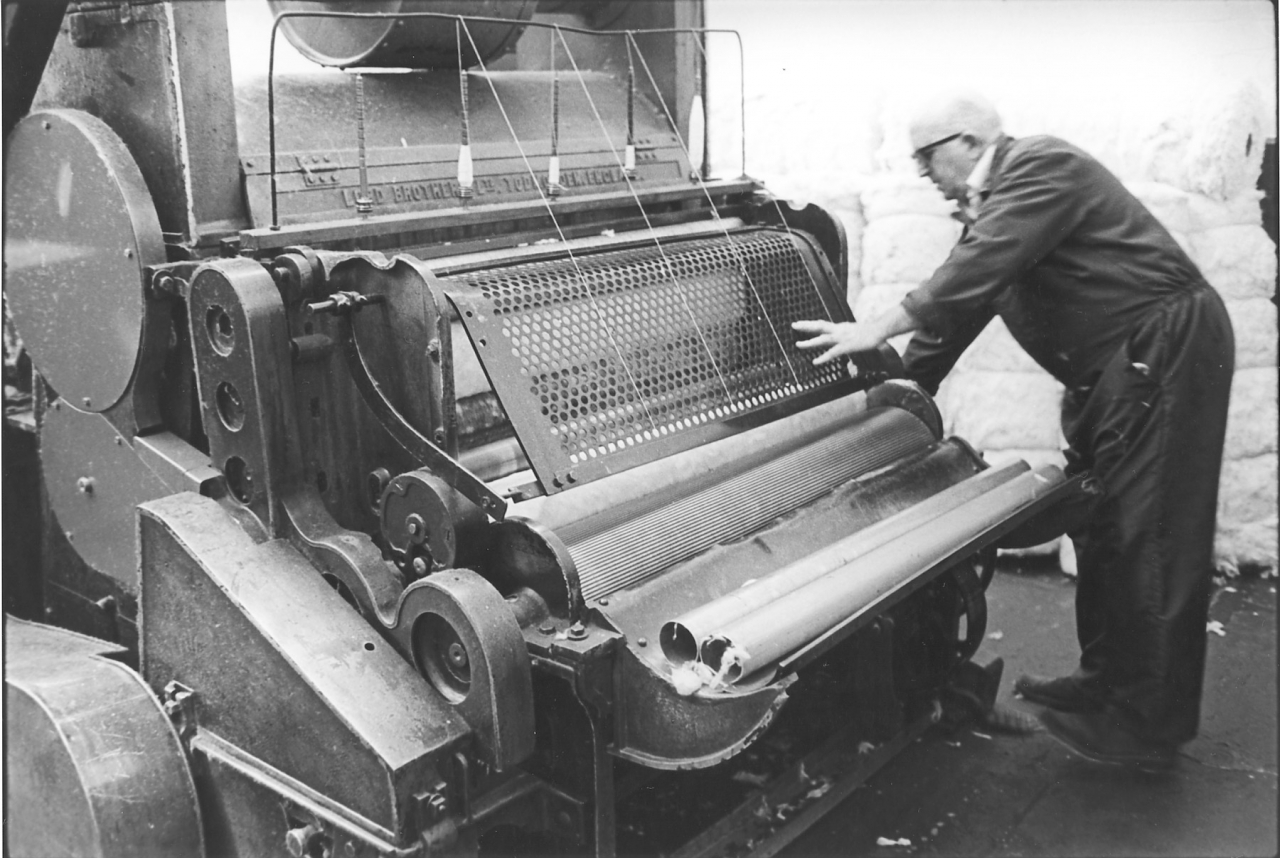
R – Yes, that's at the front, yes.
So what are you doing there?
R - Just readying for a lap coming out there I think. Yes. That's a full lap that one.
And, and you say these are, they weigh about, what did you say they weighed?
R - Fifty odd pounds.
Fifty odd pounds yes. And, am I right that the laps are separated by thread?
(650)
R- Yes, by the cops, they come off the spinners what's been thrown to one side you know, not usable. And they come down to me and I've five on mine and it just keeps them nice and tight and separate.
(30 min)
These…?
R - Shells. That’s the name of them.
Shells. They are the ones you are going to put the laps on are they?
R – Yes. To fill another one up yes. I have that iron bar what goes through the middle and that puts it through another one, another lap.
Why are there two there?
R - I always put two and I haven’t to be rooting about for another one.
Oh I see. Yes.
R- I always had two spare ones on the front ready.
So one of them will get used this time and one will stay there.
R- Yes that's right.
And those standing upright are the ones that you've already finished are they? Yes.
R- That's right. Yes.
So those are completed ones.
R - Completed laps, yes.
And then presumably the chap on the breaker cards will come and collect them will he?
R- Come and collect what he wants, yes.
How often does one of those fill up?
R - I should say three to four minutes.
So you're changing that every three to four minutes?
R - Three to four minutes. Yes. Going straight through, no trouble.
Good heavens, I didn’t realise they finished so quickly.
R- Yes. I could make twelve full laps in one hour and ten minutes. I did and then had a break like in between.
So I can see now why there are only two scutchers to a mill. I didn’t realise they finished so quickly. Is this the guard?
R- The guard, yes.
(700)
And this guide wire is it with the threads on?
R- The threads on, yes.
But is that an automatic process? You say it stopped when it’s full, what’s the mechanism that stops it?
R - At the side there is like a bar at the side, and when the lap gets full it automatically knocks off.
It's on your right hand side so we can’t see it at the moment. Now, the next one is number 18. What are you doing here?
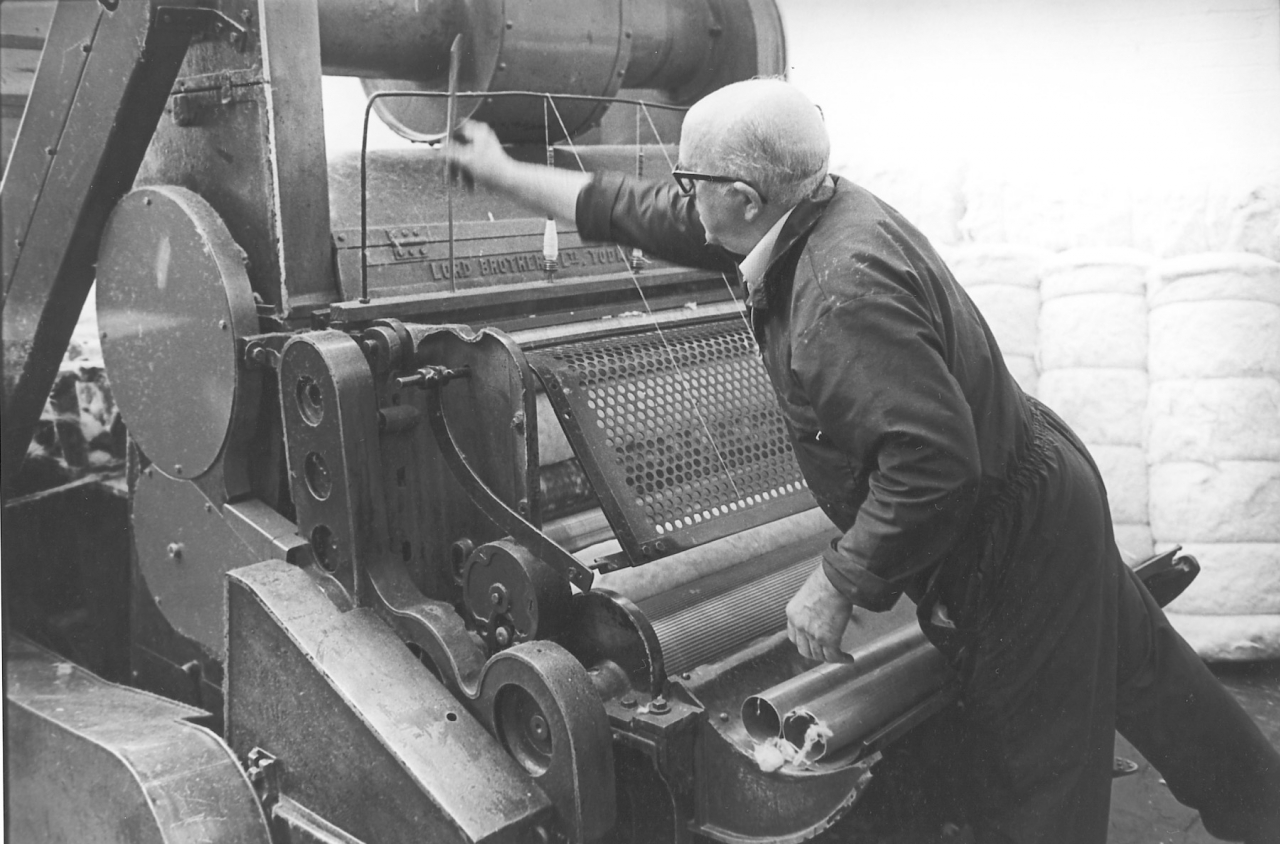
R- Oh the weighing machine’s there for weighing the lap.
Weighing the lap? Now Stanley told me something about there being some weights locked up or something, chained up, is that right?
R - Did he mean the underweights?
I don't know what he meant but he said “Don't forget to ask George about the weights being chained up” or something. Do you not know what he meant? [The balance weights for weighing the lap were in a secure box so the management could control the weight of the finished lap]
R – Well, an odd time or two you got the cotton coming through a bit on the thin side. Well, when the lap came out, knocked off and the full lot came out, sometimes it'd be underweight. Well, then you went underneath and you just, underneath were weights, different weights, and you could just turn it round reckoned about a quarter, half a pound and a pound you could put on. And then you tried at that and then if everything were all right you'd leave it then and you'd get your laps more or less normal weight. [These were different weights on the scutcher to adjust the size of the lap]
So if it was too heavy would you pull some off?
R - Oh yes, you went underneath and took the weight off.
Oh you didn't take any off the lap though.
R - No. No.
No. So are you saying that you had to jiggle the weight so it was all official and above board?
(35 min)
R – No. You alter it to your own account. If you thought it were too heavy, just take a bit off and too light, just put a bit on.
Oh I see, yes.
R - But I hadn’t much trouble at all in my waste.
Good for you. That's presumably because the machinery ran well
R - Yes. A good runner.
(750)
Right. Number 0019.
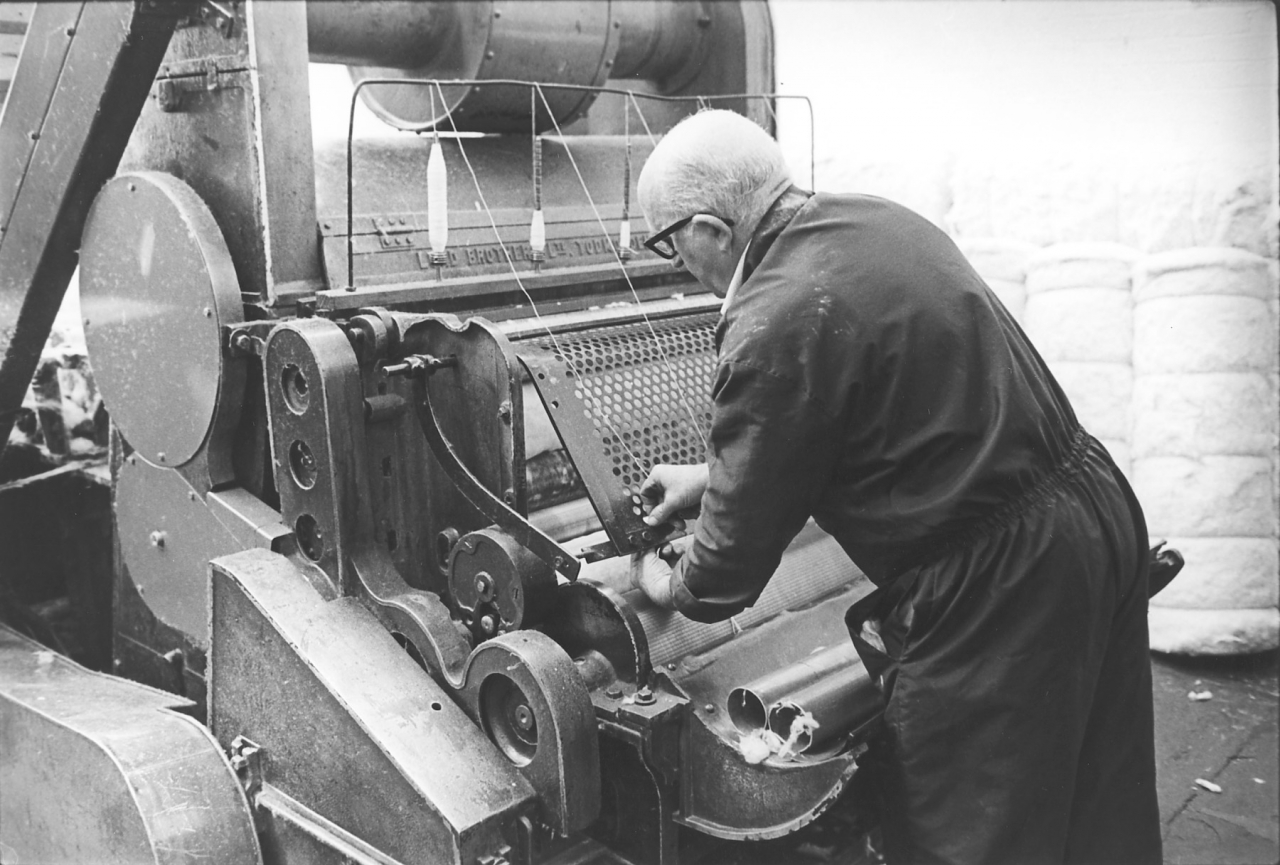
R - Oh, there it shows me putting the bar in the empty shell ready for another one to be made. That goes in between ...
It goes in between the two grooved rollers does it?
R- Yes. Two grooved rollers. Yes.
And you’ve brought yourself another shell, haven’t you.
R - Yes, ready for a spare.
So that slots in here does it? Or down there? And what is it that you do to get it starting again?
R - There is a handle .. can you see the handle? I just lift it up and away she goes, comes through and you just wrap it round the shell and away it goes.
So we need for a start off to feed it through again, you just have to make sure it's turning on to the shell. Yes.
R – On to the shell yes when you drop your cards down.
Have you kept your old Whitaker’s overall?
R - Oh no, that's me own. It were only the foreman what had the boiler suit free that had ‘Whitaker’s’ on.
Oh I thought at least you might have had one memento of your time there but obviously not. Has that exhausted that? I think it perhaps has. That's the brickwork is it at the back there.
R – Yes, the wall.
Is there any reason for that and the plaster work up there?
R – No. It's just dividing the card room.
So it's been put in later, has it? So you were right to turn over. Number 20.
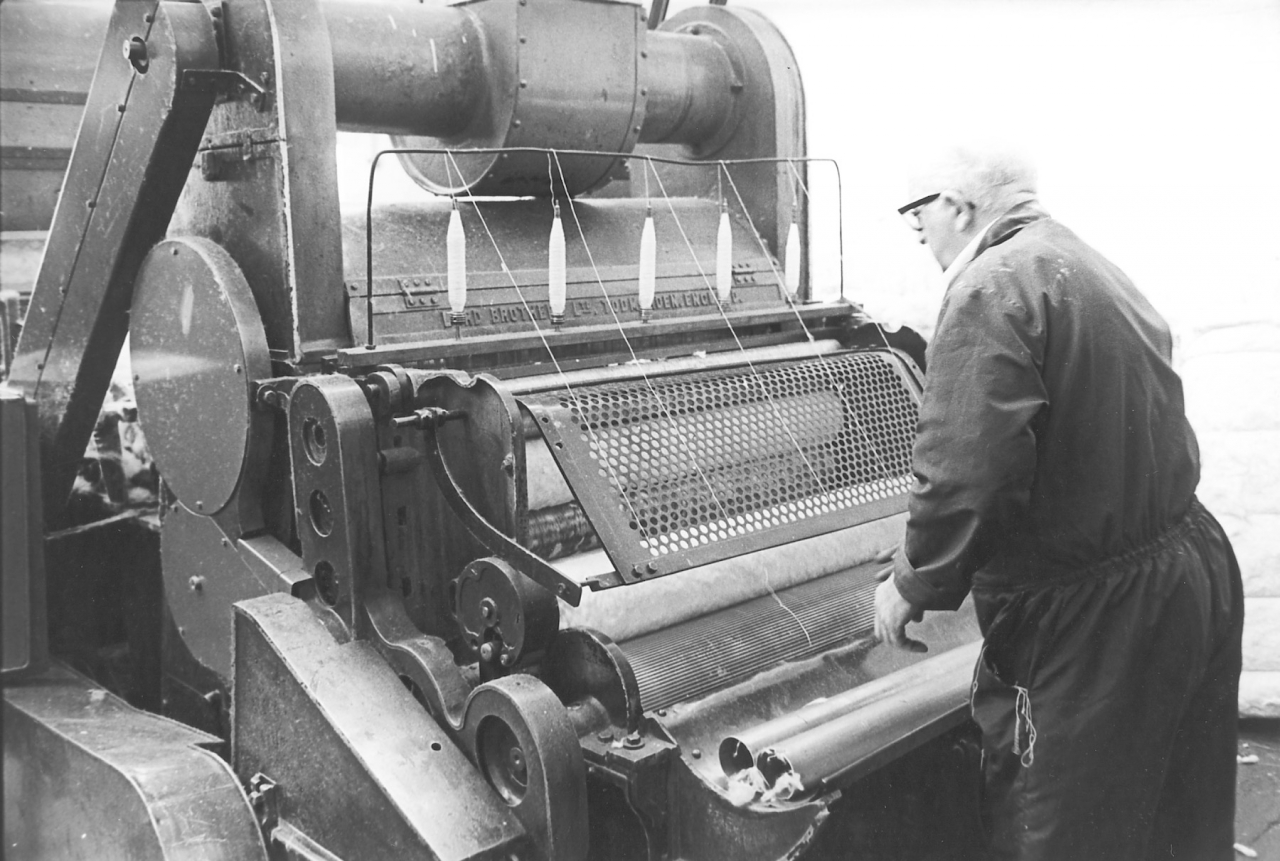
R - Yes. That's when I'm just starting, started the machine up again, just letting the wheel, the card down. And off we go again.
What's happened here? There is one cop missing somewhere.
R- Yes, you know when they unwind their selves I put a new one on after. A fresh one.
You put a new one on when?
R - When they go empty. When them cops become empty I puts a full one on again like this one. It just shows me taking the empty one off there.
(800)
It just serves to separate the laps though does this?
R - Yes, that's right.
And do they to get fed through the breaker cards with the lap?
R – Yes, go through.
So .. you are starting this on number 0020 are you? What are you doing with your right hand, you look as if you're pressing or starting something with your right hand? Down the side.
R- No I'm just cleaning the wheel.
You are just cleaning it?
R - A wheel .. for letting the card down. It lets the weights down at either side.
And what do the weights do George?
R - They always keep it, you know, firm.
The lap firm? Yes. And then 0020?
R - Turn over that. That's me taking the empty un off. Oh no, I’m putting a fresh cop on.
Do you have to go on the scrounge for those or are they brought down to you?
R- No, they're brought to us more or less. Sometimes I’ve gone up into the spinning room and brought a few down meself, like.
And it hasn't started to come through has it? The lap? So is that because you won't have started it?
R- 1 won’t have started it probably.
No. OK. Twenty-two.
R - Here I'm just threading one up there, a full one.
Where did it have to be threaded through?
R- Just thrown over the back of the lap and then it drags on.
So number 23 should be somewhere near lift off. Full cops. So you've done them all.
R - Yes, I've done them all. It’ll be all right for a bit.
And the lap’s started to feed through. You can see it building up can’t you. When the lap’s full does it rest against that guard wire?
R – No, it builds itself up till when it gets full up it's nearly touching it, but it not ...
Not quite…
R - So it doesn’t disturb it, taking it off or anything.
(850)
Is there one thread, or it looks like one thread on number 23 that’s fallen down. Is that…?
R – I’ll probably be throwing that back.
You perhaps just fed it on you think?
R - Yes I may have done.
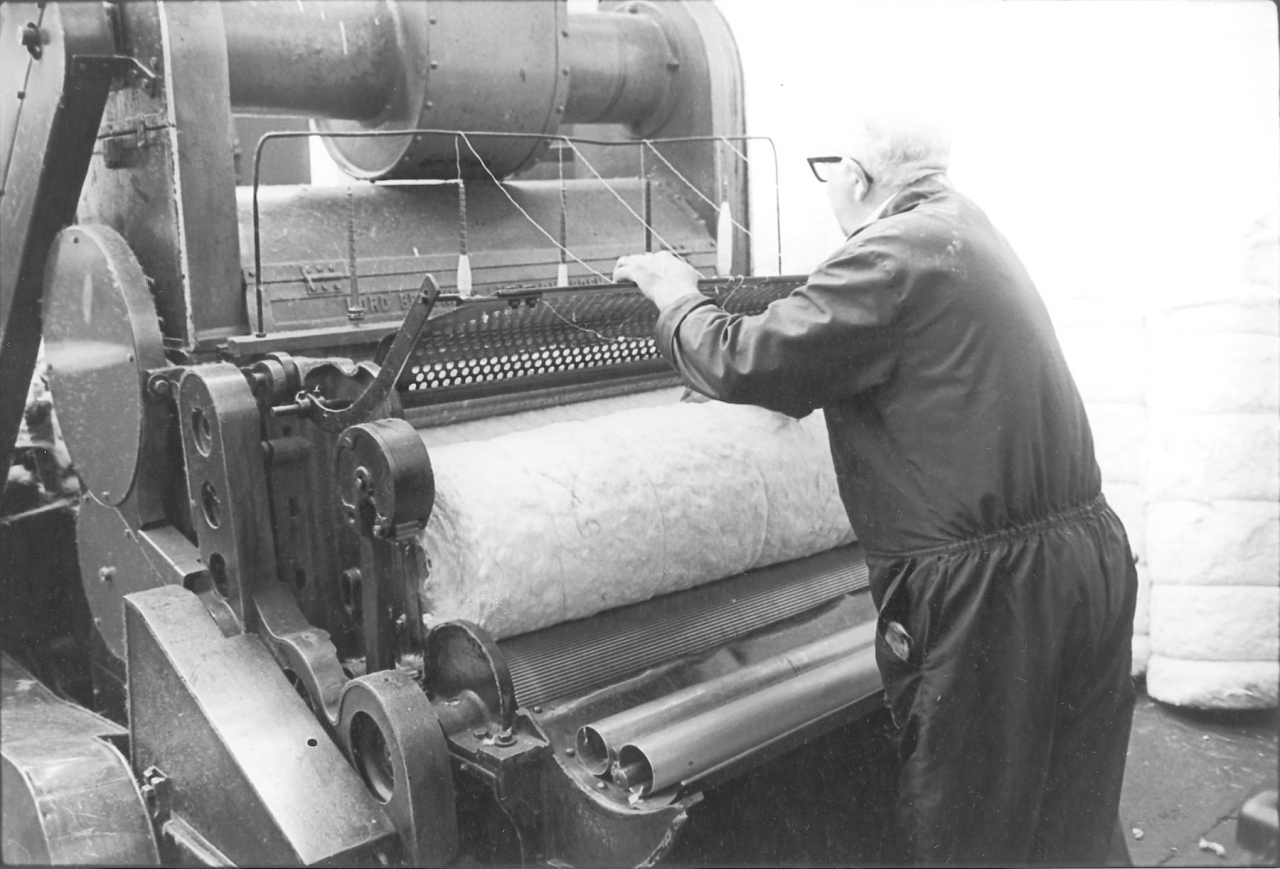
Mary has got the pictures mixed up unfortunately but I think all is clear. Here's the [picture she missed of a full lap ready to come of the machine to be weighed.
We have just moved on to number 0028 because George has worked the Derby Doubler, and we thought we’d just have a few words on that ...
R - Yes I started on the Derby Doubler. And there is two of us, one at either side of the doubler, feeding the tapes into the Doubler, which has on the top a section of tin, which is separated so as the tapes go forward straight. Then they go down into the middle, and then on to the front, makes a solid lap at the front then. Then that shuts off automatically.[when it’s full]
Yes, I noticed you called them tapes, I've heard them called rovings, is there any difference?
R - I don’t think there is much difference. Some call them rovings and some call them tapes.
Do you knew how many tapes there are down there? It doesn't matter I just wondered if you know. I can count them.
R - Towards eighty I think.
Eighty?
R - Either side, or just over may be.
Hundred and sixty about altogether. Yes. What do you call those tins that they the rovings are brought up in?
R- These? Cans.
Cans?
R – Yes. Them comes from the breaker cards.
And, and this is another blending process isn’t it.
R – Yes.
And another mixing process. There are some bobbins at the back being stored up. Have those come from you? All those come from the breaker cards? No, they won't have come from the breaker cards, from the…
R- From the doubler. And from there they go to the finisher cards.
Yes. So the lap that comes off the Derby Doubler is quite a heavy lap.
R - Fairly heavy yes.
I think you can perhaps see the metal guides a bit more clearly.
R – Yes.
Is there anything else on 27. Oh yes you can see it, see it much more clearly there.
R – See the divisions.
What’s the metal rod on the top, on each side?
R - Oh the metal rollers. That's where the tapes is fed through. There's two sets of metal rollers, one on the bottom the full length of the doubler and then the other rollers goes on the top and the tapes is fed through the middle, and then it's taken through the different ...
Guides or whatever, yes.
R - Guides right through to the front on to the lap.
I gather that these metal bars higher up are the starting and stopping bars.
R- Starting and stopping, yes.
(918)
SCG/29 June 2003
5,732 words.
LANCASHIRE TEXTILE PROJECT
TAPE 80/SHH/03
THIS TAPE HAS BEEN RECORDED ON APRIL 14TH 1980 AT 2 CRABTREE BUILDINGS, BURY ROAD, RAWTENSTALL. THE INFORMANT IS GEORGE PICKUP, SCUTCHER. THE INTERVIEWER IS MARY HUNTER.
Now, we were just talking about the Derby Doubler George I think. [Spring Vale folio, carding pictures, 0028.]
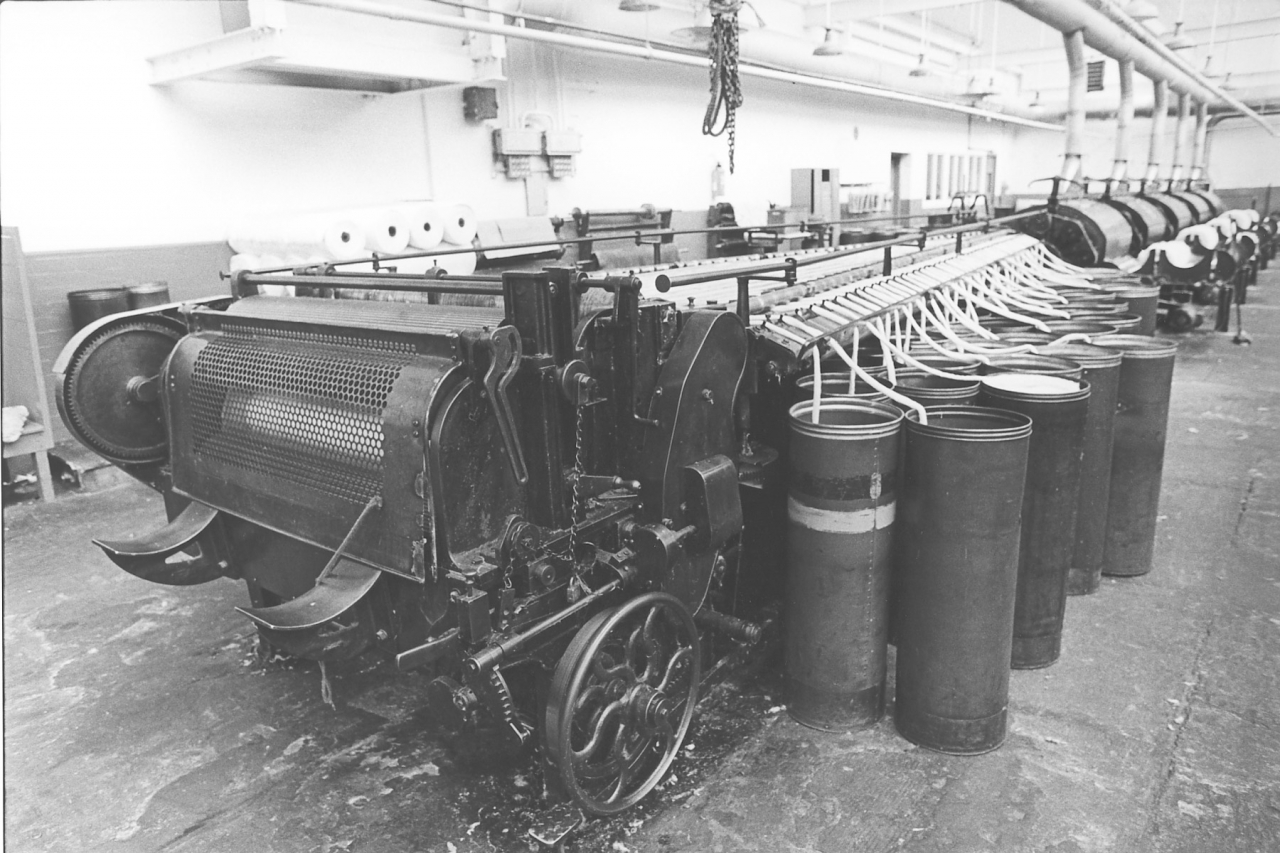
R- Yes.
And we are now looking at picture number 0028. That's right, we were talking about the stopping and starting bars.
R - Stopping and starting bars yes.
Now, when I have seen that machine working it seems to be stopping a lot why is that?
R - Probably they've used all their cans up, there is so many cans at each side and probably the cans on the Doublers got empty and they've been replaced for the full ones and then they'll be waiting for the next set of full cans to come out.
(50)
Did it stop automatically then when there wasn't any roving going through?
R - Yes.
And then how do you piece it up when you're starting a new one on?
R - You shove the new can under just through the, there's a hole there all along.
A hole? Yes.
R - Then just shove the roving through and it takes it in itself then.
Then if it doesn't take it in properly that must have been when I’ve seen it stopping and starting then.
R- Probably
This stack of….
R- Doubler laps.
These laps are from the doubler waiting to go on the finishing cards are they?
R - Yes, on to the finishing cards.
And those machines on the left of the picture are the breaker cards are they?
R- No, those is the finishing cards.
Oh are they?
R- Yes, and those are the laps that go on them.
And on number 31 you can see the front end of the… [28 actually]

R- The doubler, yes.
And underneath that guard wire, which is the same sort of guard that you have on the scutcher…
R- Similar, yes.
Is there a bobbin, a lap building up?
R- That’s right, yes.
How long does it take one of them to build up?
R- I should say about five to six minutes.
Is that all?
R- If all the cans are full and it’s kept going without any ends being broken.
And the metal supports at the front of the machine?
R - Stands yes.
What’s that for?
R – That’s for to rest a lap on when it comes out.
When you are getting it out. It’s a good view of the shed that.
R- Yes it is.
What happens on the next one? I think it's finished there isn’t it? The machines at the back of the Derby Doubler, on 31, what are those?
R - Breaker cards.
Those are the breaker cards are they? And that's the process before the Derby Doubler.
R - That's right, yes.
And .. so it goes from, from the scutcher to the breaker cards.
R - Yes. Then from the breaker cards to the Doubler.
Yes. And then from the Doubler to the finishing cards.
R- Finishing cards,
And then from there up to the .. spinning
R- Up to the spinning department.
I just thought before we’d finish George that we ought to let you have a look at number 97. Now, what's going on there?
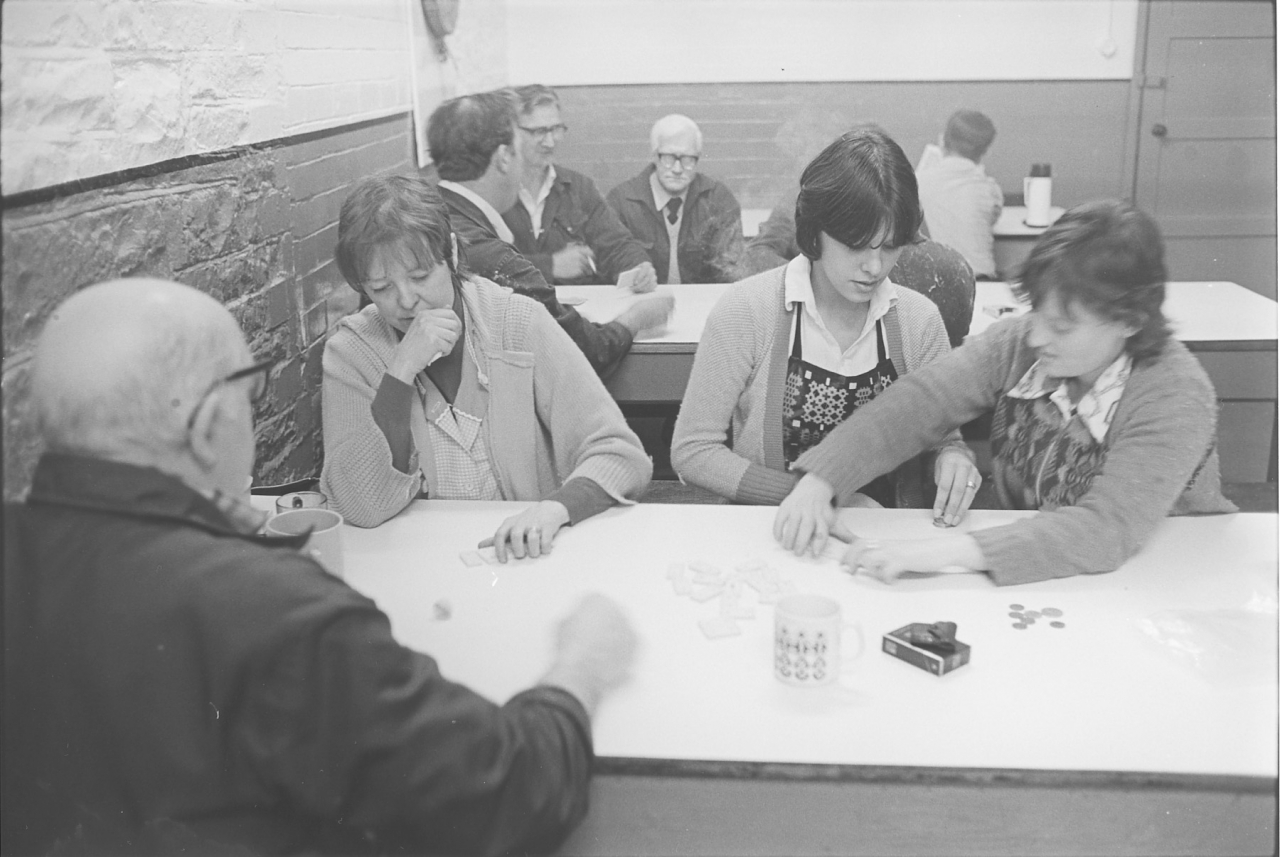
R - At Dinner break.
Where was this photograph taken?
R - In the canteen at dinner break, us dinner break. We always liked to go in for us dinner and then after have a smoke and a game of dominoes. Some of the other chaps liked a game of cards, but we always used to have us a game of dominoes.
(5 min)(150)
I notice you got on the table with all the ladies George.
R - Oh, I don’t bother. We used to enjoy us games of dominoes.
Did you play for money?
R - Oh yes. Started playing for nothing at the beginning and then Pat decided to play for five pence.
Pat’s the one in the middle isn’t she.
R- Yes. So we started playing for five pence.
What sort of things did you have for your lunch?
R - All sorts, sometimes there were chips and meat pie and beans and different dinners like. Sometimes you could have egg on toast and ...
You had your dinner there did you? You didn't take it with you.
R- Sometimes I used to take mine.
Yes. And let's think that's there many a joke exchanged hands
R - In the canteen, yes.
Just before we finish I think it would be good to report for posterity on the references you had George when you left. You’ve got two there, haven't you?
R- Yes.
And who are they from?
R - One from Mr Roy Tomlinson.
Was he the manager?
R - He was the manager at our mill.
At Spring Vale yes.
R - Spring Vale. Have I to read…?
Yes.
R - To whom it may concern. Mr George Pickup of 2 Crabtree Buildings, Bury Road, Rawtenstall, has been working with our company as a scutcher winder since April 1971. The department in which he works is closing with the regrettable result that he is being made redundant. Since he started work with us he has proved himself to be a loyal and hard working employee who attended work regularly. He is in the best of health and his duties involve strength and physical work. We wish him good fortune in the future knowing that he will be a credit to any future employer.
Well you can’t do much better than that, can you George.
(250)
R - No.
And who in the other one from?
R - And the second ... what they call these
References?
R- Second reference is from the Personnel Director David Hardman. To whom it may concern. Mr G Pickup has worked with our company since April 1971 as a grinder (which should be scutcher tenter). It is with the utmost regret that we are compelled to make him redundant along with most of the other people who work at our Spring Vale Mill. He has shown himself to be a person of considerable ability who can be relied upon to work diligently with a minimum of supervision but maximum pride in his work. His attendance and time keeping have been exemplary and his honesty and integrity beyond doubt. In spite of mature years he has enjoyed good health and can carry out normal physical work if necessary. Good working relationships with his colleagues have also been enjoyed because of his pleasant disposition. When I say the major considerations when recruiting employees is of course their past loyalty and willingness to work hard and adapt. We have complete confidence that he will continue to show these qualities in any future employment as he has in the past. Our best wishes go with him for his future success and happiness.
(300)
David’s father is the Managing Director, Richard Hardman isn’t he?
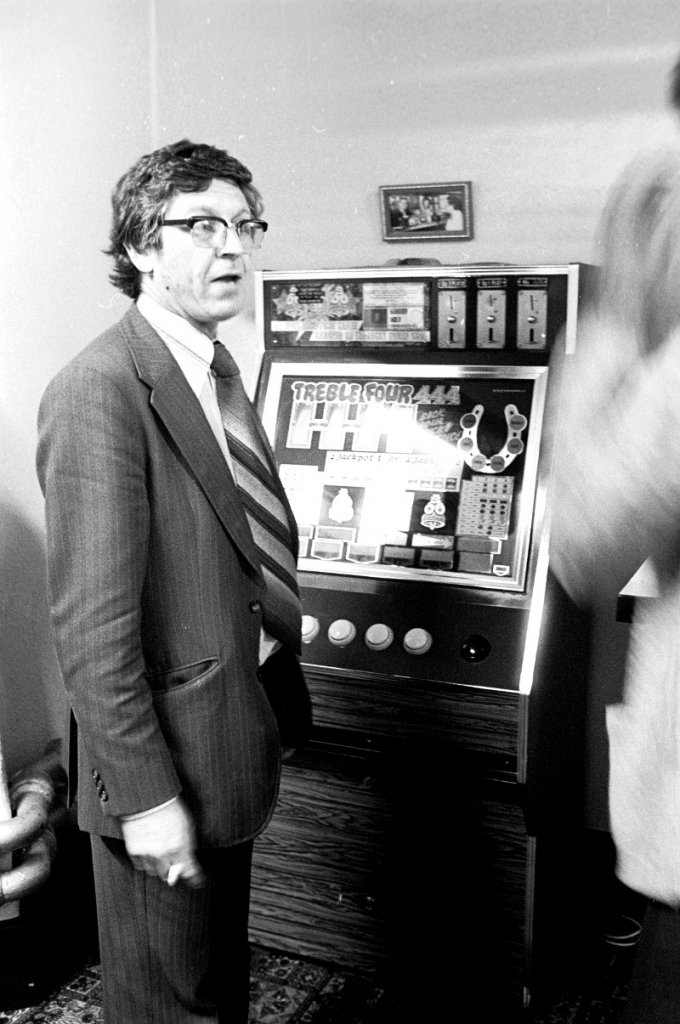
Richard Hardman.
R- Yes, Richard Hardman.
Well thank you very much George.
SCG/29 June 2003
1,187 words.
